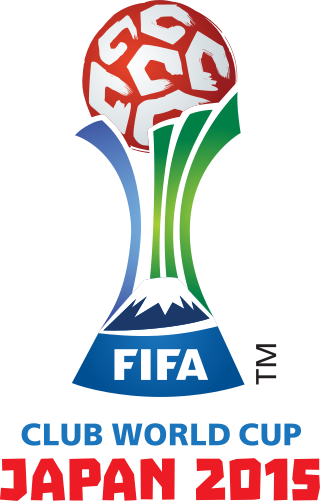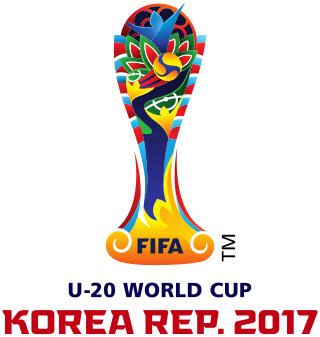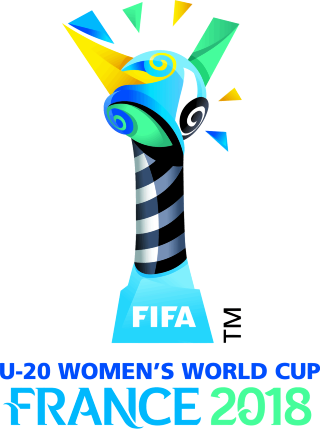Related Research Articles

The 2010 FIFA World Cup, also branded as South Africa 2010, was the 19th FIFA World Cup, the world championship for men's national football teams. It took place in South Africa from 11 June to 11 July 2010. The bidding process for hosting the tournament finals was open only to African nations. In 2004, the international football federation, FIFA, selected South Africa over Egypt and Morocco to become the first African nation to host the finals.

The 2009 FIFA Confederations Cup was the eighth Confederations Cup, and was held in South Africa from 14 June to 28 June 2009, as a prelude to the 2010 FIFA World Cup. The draw was held on 22 November 2008 at the Sandton Convention Centre in Johannesburg. The opening match and the final was played at Ellis Park Stadium in Johannesburg. The tournament was won by Brazil, who retained the trophy they won in 2005 by defeating the United States 3–2 in the final.

The 2018 FIFA World Cup was the 21st FIFA World Cup, the quadrennial world championship for national football teams organized by FIFA. It took place in Russia from 14 June to 15 July 2018, after the country was awarded the hosting rights in 2010. It was the eleventh time the championships had been held in Europe, and the first time they were held in Eastern Europe. At an estimated cost of over $14.2 billion, it was the most expensive World Cup ever held until it was surpassed by the 2022 World Cup in Qatar.
Group A of the 2010 FIFA World Cup began on 11 June and ended on 22 June 2010. The group consisted of host nation South Africa, Mexico, Uruguay and the runners-up from 2006, France.
Group D of the 2010 FIFA World Cup began on 13 June and ended on 23 June 2010. The group consisted of Germany, Australia, Serbia and Ghana. Along with Group G, it was considered to be a group of death.

Mark William Geiger is an American sports administrator and former soccer referee. He is the senior director of match officials at the Professional Referee Organization (PRO), which oversees domestic referees in Major League Soccer (MLS). Geiger previously officiated in MLS and was on the FIFA International Referees List from 2008 to 2019. At the international level, Geiger refereed the 2012 Olympics, the 2013, 2015, and 2017 CONCACAF Gold Cups, and the 2014 and 2018 FIFA World Cups. At the 2014 World Cup, he became the first referee from the United States to officiate a knockout match at a World Cup tournament. Before becoming a full-time referee, Geiger was a high school mathematics teacher.

The 2019 FIFA Women's World Cup was the eighth edition of the FIFA Women's World Cup, the quadrennial international Women's football championship contested by 24 women's national teams representing member associations of FIFA. It took place between 7 June and 7 July 2019, with 52 matches staged in nine cities in France, which was awarded the right to host the event in March 2015, the first time the country hosted the tournament. The tournament was the first Women's World Cup to use the video assistant referee (VAR) system. This was the second and last edition with 24 teams before expanding to 32 teams for the 2023 tournament in Australia and New Zealand.

The 2015 FIFA Club World Cup was the 12th edition of the FIFA Club World Cup, a FIFA-organised international club football tournament between the winners of the six continental confederations, as well as the host nation's league champions. The tournament was hosted by Japan between 10 and 20 December 2015.

The 2017 FIFA U-20 World Cup was the 21st edition of the FIFA U-20 World Cup, the biennial international men's youth football championship contested by the under-20 national teams of the member associations of FIFA, since its inception in 1977 as the FIFA World Youth Championship. The tournament was hosted by South Korea from 20 May to 11 June 2017.
The FIFA World Cup, sometimes called the Football World Cup, but usually referred to simply as the World Cup, is an international association football competition contested by the men's national teams of the members of Fédération Internationale de Football Association (FIFA), the sport's global governing body. The championship has been awarded every four years since the first tournament in 1930, except in 1942 and 1946, due to World War II.

The 2019 FIFA U-17 World Cup was the 18th edition of the FIFA U-17 World Cup, the biennial international men's youth football championship contested by the under-17 national teams of the member associations of FIFA. It was hosted by Brazil between 26 October and 17 November 2019.

The 2019 FIFA U-20 World Cup was the 22nd edition of the FIFA U-20 World Cup, the biennial international men's youth football championship contested by the under-20 national teams of the member associations of FIFA, since its inception in 1977 as the FIFA World Youth Championship. The tournament was hosted by Poland between 23 May and 15 June 2019. This was the first FIFA tournament hosted by Poland; the country had hosted UEFA international football events in the past including the UEFA Euro 2012 with Ukraine and the 2017 UEFA European Under-21 Championship.

The 2018 FIFA U-20 Women's World Cup was the ninth edition of the FIFA U-20 Women's World Cup, the biennial international women's youth football championship contested by the under-20 national teams of the member associations of FIFA, since its inception in 2002 as the FIFA U-19 Women's World Championship.
The FIFA World Cup is an international association football competition contested by the men's national teams of the members of Fédération Internationale de Football Association (FIFA), the sport's global governing body. The championship has been awarded every four years since the first tournament in 1930, except in 1942 and 1946, due to World War II.

The 2018 FIFA U-17 Women's World Cup was the 6th edition of the FIFA U-17 Women's World Cup, the biennial international women's youth football championship contested by the under-17 national teams of the member associations of FIFA, since its inception in 2008.

The 2018 FIFA Club World Cup was the 15th edition of the FIFA Club World Cup, a FIFA-organised international club football tournament between the winners of the six continental confederations, as well as the host nation's league champions. The tournament was hosted by the United Arab Emirates from 12 to 22 December 2018.
The following is a list of match officials who officiated at the 2018 FIFA World Cup.

The 2020 FIFA Club World Cup was the 17th edition of the FIFA Club World Cup, a FIFA-organised international club football tournament between the winners of the six continental confederations, as well as the host nation's league champions. The tournament was hosted by Qatar.

The 2021 FIFA Club World Cup was the 18th edition of the FIFA Club World Cup, a FIFA-organised international club football tournament between the winners of the six continental confederations, as well as the host nation's league champions. The tournament was held from 3 to 12 February 2022 in the United Arab Emirates.
Esteban Daniel Ostojich Vega is a Uruguayan football referee. He has been a FIFA international referee since 2016.
References
- 1 2 "30 referees from 28 countries appointed for 2010 FIFA World Cup". FIFA.com. Fédération Internationale de Football Association. 5 February 2010. Archived from the original on 8 February 2010. Retrieved 9 April 2010.
- 1 2 "List of referees preselected for South Africa 2010". FIFA.com. Fédération Internationale de Football Association. 24 October 2008. Archived from the original on 26 October 2008. Retrieved 9 April 2010.
- 1 2 "Crunch time for top referees". FIFA.com. Fédération Internationale de Football Association. 4 February 2010. Archived from the original on 7 February 2010. Retrieved 9 April 2010.
- ↑ "Referees gear up for FIFA World Cup". FIFA.com. Fédération Internationale de Football Association. 30 September 2008. Archived from the original on 30 September 2008. Retrieved 9 April 2010.
- ↑ "FIFA appoints match officials". FIFA.com. Fédération Internationale de Football Association. 5 May 2009. Archived from the original on 9 May 2009. Retrieved 9 April 2010.
- ↑ "Referees honing skills in South Africa". FIFA.com. Fédération Internationale de Football Association. 27 June 2009. Archived from the original on 30 June 2009. Retrieved 9 April 2010.
- ↑ "Referees medically assessed in Zurich". FIFA.com. Fédération Internationale de Football Association. 15 March 2010. Archived from the original on 17 March 2010. Retrieved 10 April 2010.
- ↑ "Two referee trios will not officiate in South Africa following fitness tests". GhanaFA.com. Ghana Football Association. Retrieved 8 November 2022.
- ↑ "List of referees for remaining matches announced". FIFA.com. Fédération Internationale de Football Association. 29 June 2010. Archived from the original on 2 July 2010. Retrieved 4 July 2010.